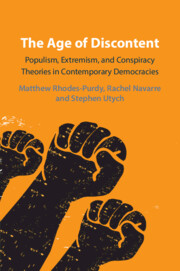Book contents
- The Age of Discontent
- The Age of Discontent
- Copyright page
- Dedication
- Contents
- Figures
- Tables
- Acknowledgements
- Abbreviations
- 1 Introduction
- 2 Left Behind vs. Backlash
- 3 Affective Political Economy
- 4 Affective Political Economy and Political Discontent
- 5 Frozen Parties, Failing Markets
- 6 Austerity, Regionalism, and Dueling Populisms in Spain
- 7 Corruption, Populism, and Contentious Politics in Brazil and Chile
- 8 The Dogs That Did Not Bark
- 9 Populism in Power
- 10 Conclusions
- References
- Index
2 - Left Behind vs. Backlash
Economic and Cultural Theories of Democratic Discontent
Published online by Cambridge University Press: 02 March 2023
- The Age of Discontent
- The Age of Discontent
- Copyright page
- Dedication
- Contents
- Figures
- Tables
- Acknowledgements
- Abbreviations
- 1 Introduction
- 2 Left Behind vs. Backlash
- 3 Affective Political Economy
- 4 Affective Political Economy and Political Discontent
- 5 Frozen Parties, Failing Markets
- 6 Austerity, Regionalism, and Dueling Populisms in Spain
- 7 Corruption, Populism, and Contentious Politics in Brazil and Chile
- 8 The Dogs That Did Not Bark
- 9 Populism in Power
- 10 Conclusions
- References
- Index
Summary
This chapter serves two primary purposes. First, it establishes the book’s conceptual schema of political discontent. It identifies three ways in which discontent can manifest: against regime institutions (low regime support/regime antipathy), against the political elite (anti-elitism and populism), or even against reality (conspiracism). This section addresses conceptual debates in the study of each type of discontent, selecting or developing definitions according to set criteria. It also discusses the two primary ways discontent can influence behavior: through support for political outsiders and through contentious politics. Second, the chapter summarizes existing approaches to the study of discontent. It discusses shared elements of the global political order, especially neoliberal capitalism, liberal democracy, and more recently multiculturalism. Political discontent varies in form from case to case but is generally shaped by a rejection of one or more elements of this order. Reviewing the scholarship on each subtype of discontent, the chapter finds a recurring debate between economic and cultural origins. Neither approach can fully explain discontent, but neither can be ignored or disproven. As a result, the chapter concludes that a comprehensive theory must synthesize these two approaches.
Information
- Type
- Chapter
- Information
- The Age of DiscontentPopulism, Extremism, and Conspiracy Theories in Contemporary Democracies, pp. 25 - 50Publisher: Cambridge University PressPrint publication year: 2023
